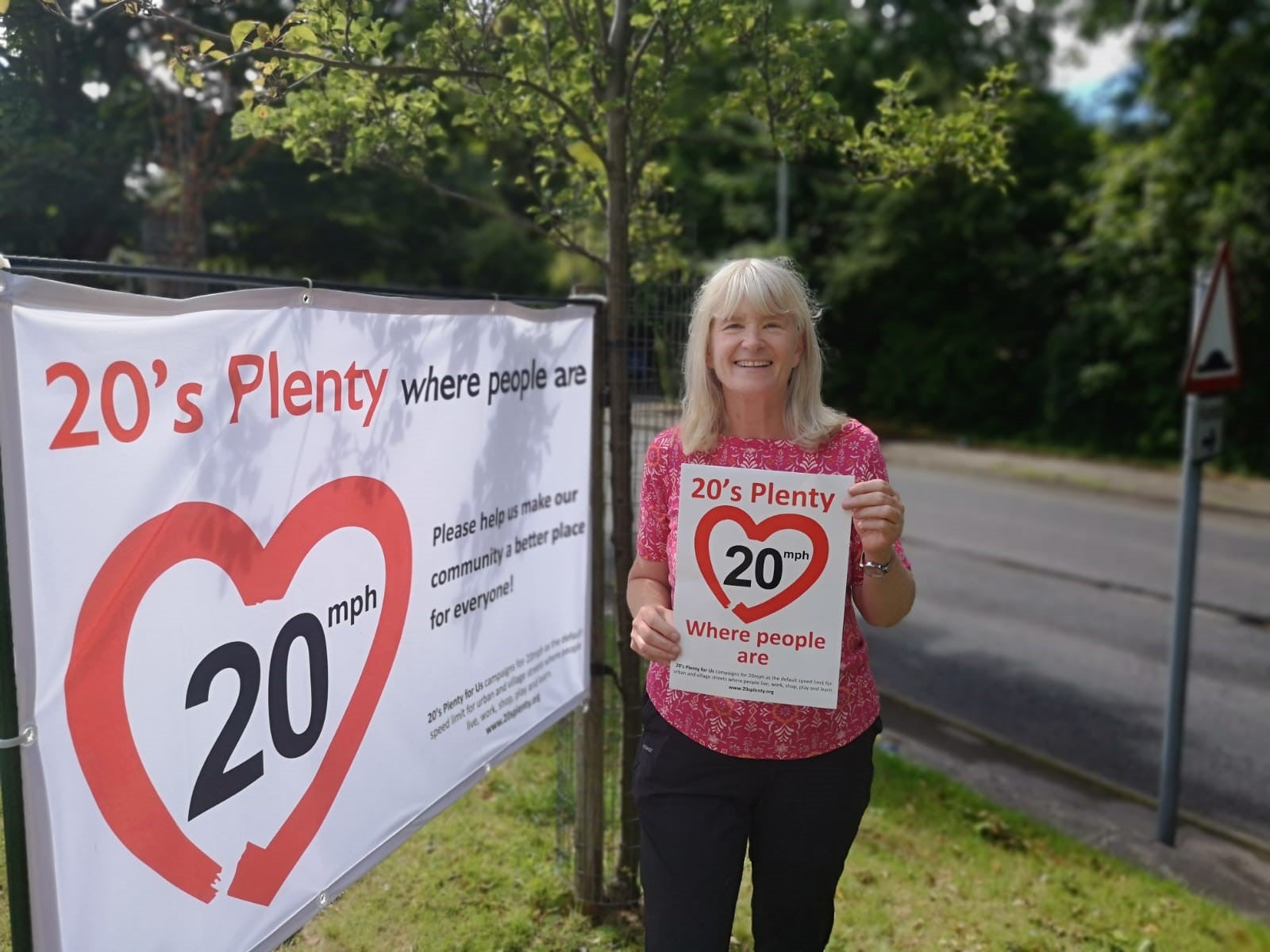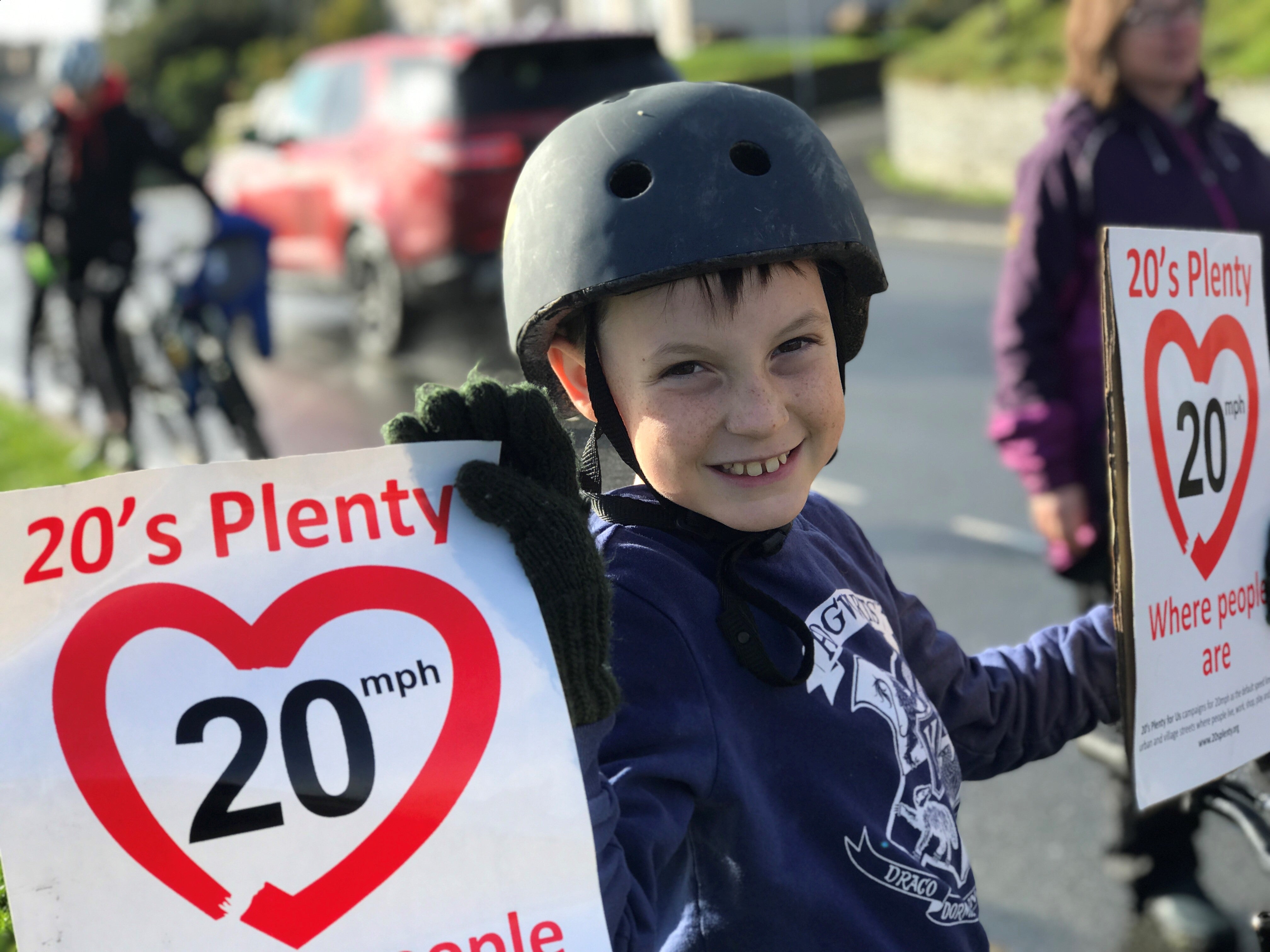‘Fewer deaths, nicer streets’: Calls for 20mph national speed limit grow after Wales leads way
Cutting limit in built-up areas would mean fewer accidents and emissions, say advocates – but not everyone is convinced

For Patsy Kane, the campaign for a national 20mph speed limit is personal.
In November last year, she was crossing Tithe Barn Road near her home in Stockport when a car, coming around a bend at 30mph, smashed into her.
She suffered a broken ankle, a bleed on her spleen and bruised ribs. She was in hospital for four days and on crutches for four weeks. But, by some measures, she also got lucky.
“There’s that statistic that one in five people are killed [when they’re hit] at 30mph,” the 64-year-old says. “That’s how close I came to not being here. Cars at that speed are killing machines but we’ve allowed them to take priority in our streets.”
The retired headteacher is now one of an increasing number of people calling for the UK’s default speed limit to be reduced from 30mph in built-up areas to just 20.
After the Welsh government voted to do just that last month, campaigners across the rest of Britain are increasingly confident that the same change will be made everywhere.
They say it would reduce accidents, bring down road fatalities, save tens of millions of pounds in health and emergency service costs, and be good for the environment at a time of climate crisis.
But opponents are not convinced. They argue that reducing speed limits risks adding to congestion and would – far from saving money – require a huge outlay in signage and re-education. Already in Wales, there are campaigns demanding the change is shelved before it is even enacted next September.
It leads to one obvious question: will 20 ever be the norm on our roads?

When Rod King talks about reducing the default speed limit, he compares it to wearing seat belts.
The 72-year-old, founder of the 20’s Plenty For Us campaign group, still remembers 1983 when belts became compulsory for front seats.
“You had these very vocal people saying they were an invasion of personal liberties and they would prefer to be thrown clear of the vehicle in the event of a crash,” he recalls at his home in the Cheshire village of Lymm.
“Yet now seatbelts, quite rightly, are just recognised as what we do. The idea of not wearing one is alien because society moves on and its attitude changes. It’s like how drink-driving was once considered perfectly acceptable.”
The same applies to 20mph as a national standard, he reckons. “Once it is done, I think people will wonder why it was ever any different,” the grandfather-of-six says.
Many towns and cities far beyond Wales are already going ahead with the change.
More than 20 local authorities now have a policy that 20mph should be the standard for residential streets. In Liverpool, Bristol, Nottingham, Newcastle and much of London, local councils presume in favour of the lower limit on any street where people live. In the Scottish borders, some 90 towns and villages have embraced the change.
“It’s already becoming the new normal,” says Phil Jones, a transport planning consultant who led the Wales 20mph taskforce. “To some extent, the Westminster government is actually behind on this, but it’s important they catch up so we get consistency across the UK as a whole.”
The arguments in favour of the decrease are undoubtedly compelling – not least the fact that it would save lives on our roads.
While pedestrians struck by a car at 30mph have a 20 per cent chance of being killed, that figure falls to just 2.5 per cent when the vehicle is travelling at 20mph.
But even that statistic doesn’t tell the full story: at 20mph, drivers have such improved stopping distances that there would be far fewer pedestrians being hit in the first place.
“Speed contributes to so many fatal crashes,” says Det Ch Supt Andy Cox of Lincolnshire Police, who is the national lead for fatal collision investigations. “And, as someone who has dealt with that devastation – with lives being torn apart because of speed – it is very simple: the more 20mph zones we have in places where there are lots of people, the better.”
Quite apart from the human tragedy, there is also a significant financial cost. The Welsh, Labour-led government has calculated that the country could save £58m over 30 years by having to deal with fewer collisions.

Less speed would also make roads more pleasant, advocates say. As the new limits became increasingly accepted, it could lead to more children playing in streets again and more parents walking youngsters to school. It would almost certainly result in an uptick in cyclists.
Crucially, too, there would be an environmental benefit. In an urban environment – where there is much stop-start driving – the vast majority of fuel is consumed by revving up to 30mph. If this was cut to 20, there would be a 26 per cent reduction in carbon dioxide being spewed into the atmosphere, according to research by engineering consultants Future Transport.
“This initiative in Wales should certainly be rolled out elsewhere,” says Jenny Bates, transport and air pollution lead for Friends of the Earth.
But not everyone is convinced.
In Wales, the Conservative opposition has called the scheme “frankly ludicrous".
Speed limits, said shadow transport minister Natasha Asghar, should “be decided by councils in their local areas, not top-down by Labour ministers”.
The cost – £32m in signage and education – was not a good use of money during a cost of living crisis, she added.
A petition demanding the legislation be scrapped before it is even implemented, meanwhile, has had almost 45,000 people sign it. Creator Adie Drury says a pilot scheme in her hometown of Buckley, Flintshire, caused “chaos” and was unneeded anyway because there “have not been high occurrence rates of road traffic accidents, deaths or injuries on roads”.
The RAC, too, has spoken out against lower limits becoming the standard.
“Rather than setting a default 20mph limit on all restricted roads it would be better to target areas where they are most needed,” the organisation’s road safety spokesperson Simon Williams has previously said.
Yet back with Patsy Kane in Stockport, such arguments no longer hold.
She and her neighbours in the town’s Heaton Moor area are now fighting for the council to designate their neighbourhood a 20mph zone, while also supporting the national campaign for country-wide change.
“Reducing speed means less deaths and nice streets,” she says, “Who would argue with that?”





Join our commenting forum
Join thought-provoking conversations, follow other Independent readers and see their replies
0Comments